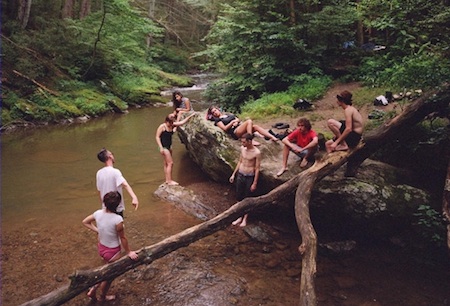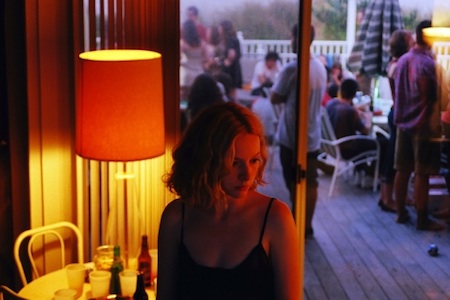The local becomes the global in Matt Porterfield’s films; small details explain a whole world. Visual essays on the lives of ordinary people, with a defiant, French New Wave-attitude toward story, Porterfield’s work leaves audiences no choice to but to feel their way through the experience and arrive at their own conclusions. After his highly acclaimed sophomore feature, Putty Hill (2010), impressed select audiences around the world, his latest, I Used to Be Darker, had its world premiere at Sundance’s NEXT section and moved on to the acclaimed Berlin International Film Festival a few weeks back. I spoke with him there.
Keyframe: Easy questions first: Why did you choose to be a filmmaker?
Matt Porterfield: I ask myself that sometimes. How did I find my way here? I guess it just combines my interest in the plastic, the dramatic, the literary arts and photography. But I am also interested in people and places and the natural world. You know, when I was a kid I grew up fascinated by David Attenborough’s shows. I wanted to be naturalist. At least I thought I did until I started to study science and realized it was not for me. But I think I took away a lot from that: my way of filmmaking is very much formed by Living Planet and Life on Earth. So now I am trying to create a reflection of life on screen that feels accurate and honest.
Keyframe: Only a naturalist? Your films also seem like you would be a spiritualist. The stories you tell in all their localness are at the same time very universal, a whole world that can be found in one single grain. Your storytelling has a certain flow to it that seems to have no narrative goal to reach but rather floats and relies on its visuals
Porterfield: Hmm… (thinks), yes you kind of nail it on the head. What can I say, you said it better than I could. Yes, I think the local has a greater potential to be universal. I am not sure about being spiritual but what I do is I work from the inside out. I do not try the conceptual, thematic approach. I like to see the space and the people that inhabit that space and then have things grow out from there. I am less interested in conflict theory, traditional dramatic structures, and more in trying to create authenticity in the moment. Each of my films takes place in a rather narrow window. I always set my eyes on families in all my films, be it Hamilton (2006), Putty Hill (2010) or my new one I Used to Be Darker (2013). And it is always just over the course of a couple of days. This way I also do not have to worry at all about the traditional narrative.

Keyframe: So what is I Used to Be Darker portraying?
Porterfield: It is simply an honest and balanced film about divorce. And having it balanced was our main goal. It has three characters that highlight different sides and everyone gets to speak. And then in the end Kim gets the last word by singing a song. And this song and its lyrics say everything that needs to be said and I like that. But the film is not specific. It gives hints at what the motivations of the people are, where they come from and where they might be going. If you end abruptly you can sometimes allow the audience to keep on thinking about it after they leave the cinema and that is a goal of mine.
Keyframe: What is in your opinion your personal contribution to film art?
Porterfield: Tough question! I think I am trying to create a body of work that reflects some diversity in styles and themes. And I want to show the diversity of the American middle class. If I could wish for audiences to walk away from my films with something, it would be a sort of openness to the world, to the subjects of the film, to divergent narrative films and formal devices. I am trying to open myself up to the world. If my films can do that to any small extent then I’d be happy.
When I was a kid I grew up fascinated by David Attenborough’s shows. I wanted to be naturalist. At least I thought I did until I started to study science and realized it was not for me. But I think I took away a lot from that: my way of filmmaking is very much formed by ‘Living Planet’ and ‘Life on Earth.’ So now I am trying to create a reflection of life on screen that feels accurate and honest.
Keyframe: Have you experienced this kind of interaction between the audience and the film and the audience and you as a filmmaker in that sense?
Porterfield: I think so. My films do need a kind of less passive audience who does not mind thinking about form as something equal to the narrative. I am fed by the conversations that happen around the films, I am interested to hear what people respond to and what not, because really it is like learning a new language. And it seems to work: my audience is expanding with each film and I have found a wider audience in the international scene. People in Europe, Asia and Latin America respond just like the American audience. So there is this one global nation of film that allows conversation across all boundaries and cultures.
Keyframe: Do you remember the one thing that someone has said about your film that really surprised you or had never occurred to you before?
Porterfield: Oh yes! There was someone who had seen all of my work and asked about water as a recurring leitmotif in my films. And it blew my mind, as I had never realized that there is a theme of water in my films. I like that idea and I like all the different readings and interpretations of my work.
Keyframe: But looking at the economic side of making films like yours, it must be really hard to finance them. How did you manage to get this film financed? Did you use Kickstarter like with Putty Hill?
Porterfield: Yes it is hard and yes I still need lots of independent financing. But you see, audiences grow larger and many stay with me and then with the next film invest in it and take part in the process of creating more art. But it is a hard process. Also, it has become easier to interest private equity investors. I mean nobody gets rich on these films but if you can give people a return on their investment or they can use it for tax reduction that does help. Also, I have been lucky to receive grant support. Some of it I used to live, the most part I spent on my film.
Keyframe: Within the American independent scene, where are you positioned? Are you the Bresson-like auteur, the underdog from Baltimore?
Porterfield: (Laughs.) I don’t know! I’d take any of those. You know, it was interesting to have my premiere in the NEXT category at Sundance this year because I responded to all of the films in that program. In theory the program highlights films with modest budgets, usually with non-professional cast and rather regional. They usually work in a non-traditional mode. So I guess for the most part it is the economy that puts me into that category. So this is me. In terms of how the industry views my films: I really don’t know, I think I am still figuring that out.
Keyframe: If you had an unlimited budget, what would be your dream project to make?
Porterfield: An adaptation of Anne Carson’s verse novel The Autobiography of Red. That or William Burroughs’ Wild Boys. I really want to do an adaptation of a novel. That is a real challenge. Those novels have a very visual language. The words on the page immediately create a visual and there is this abundance of ways and directions to go in order to translate that into film. Also both the novels have fantastical elements. To do it right, one needs a proper budget. This is the direction I would want to go, if I had the money.
Beatrice Behn is a German film critic, curator and festival director of the International Comedy Film Festival.





